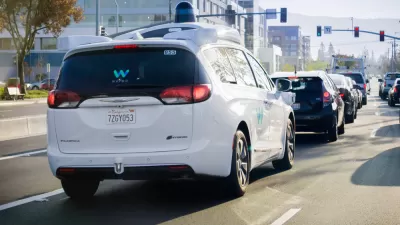Denver developers are building parking that can be converted into housing, anticipating radical changes that autonomous vehicles could bring to city life.
In a forward-thinking move to anticipate some of the radical changes that could be coming from autonomous vehicles, Denver developers are building parking that can be converted into housing or retail. Their thinking, according to a story in the Denver Post by Emilie Rusch, is that as people switch to using autonomous vehicle services to drive them around, the need for personal vehicles will decrease dramatically and cities will be overstocked with parking.
Far from seeing this as the dreams of some far-fetched future, the development group, Denizen, has already started building for this eventuality. "The more than 700 above-ground parking spaces in the project’s first phase have been designed so they can be renovated into residential, office or retail space as future demand warrants," Rusch reports.
Thomas Fisher, Director of the Metropolitan Design Center at the University of Minnesota, hypothesizes that, "one shared autonomous vehicle, operating like today’s taxi or car-sharing services but without a human driver, could take as many as 11 conventional vehicles off the road." This vision of the future is more than academic in Denver; parking must be ready to be upgraded or, in some situations, it will be in violation of city code. "In Denver, the ground floor of stand-alone parking garages downtown are required to be suitable for conversion to an active, nonparking use in the future" according to City Planning and Development Supervisor Chris Gleissner.
FULL STORY: Denver developers have seen the future of parking, and it is no parking at all

Alabama: Trump Terminates Settlements for Black Communities Harmed By Raw Sewage
Trump deemed the landmark civil rights agreement “illegal DEI and environmental justice policy.”

Planetizen Federal Action Tracker
A weekly monitor of how Trump’s orders and actions are impacting planners and planning in America.

The 120 Year Old Tiny Home Villages That Sheltered San Francisco’s Earthquake Refugees
More than a century ago, San Francisco mobilized to house thousands of residents displaced by the 1906 earthquake. Could their strategy offer a model for the present?

In Both Crashes and Crime, Public Transportation is Far Safer than Driving
Contrary to popular assumptions, public transportation has far lower crash and crime rates than automobile travel. For safer communities, improve and encourage transit travel.

Report: Zoning Reforms Should Complement Nashville’s Ambitious Transit Plan
Without reform, restrictive zoning codes will limit the impact of the city’s planned transit expansion and could exclude some of the residents who depend on transit the most.

Judge Orders Release of Frozen IRA, IIJA Funding
The decision is a victory for environmental groups who charged that freezing funds for critical infrastructure and disaster response programs caused “real and irreparable harm” to communities.
Urban Design for Planners 1: Software Tools
This six-course series explores essential urban design concepts using open source software and equips planners with the tools they need to participate fully in the urban design process.
Planning for Universal Design
Learn the tools for implementing Universal Design in planning regulations.
Clanton & Associates, Inc.
Jessamine County Fiscal Court
Institute for Housing and Urban Development Studies (IHS)
City of Grandview
Harvard GSD Executive Education
Toledo-Lucas County Plan Commissions
Salt Lake City
NYU Wagner Graduate School of Public Service





























